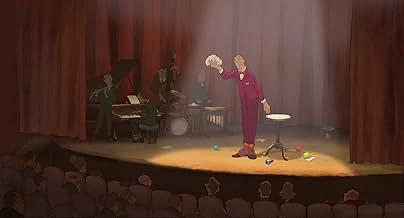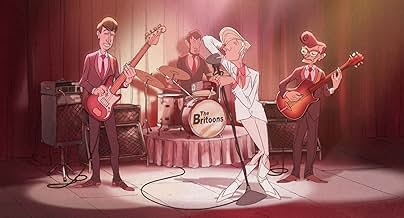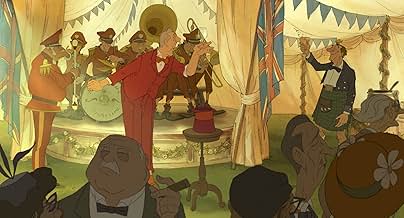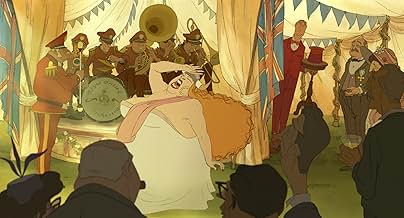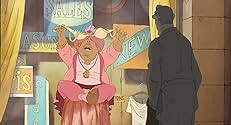VALUTAZIONE IMDb
7,4/10
37.187
LA TUA VALUTAZIONE
Un illusionista francese si ritrova senza lavoro e parte per la Scozia, dove incontra una giovane donna. Le avventure che ne derivano cambieranno per sempre la vita di entrambi.Un illusionista francese si ritrova senza lavoro e parte per la Scozia, dove incontra una giovane donna. Le avventure che ne derivano cambieranno per sempre la vita di entrambi.Un illusionista francese si ritrova senza lavoro e parte per la Scozia, dove incontra una giovane donna. Le avventure che ne derivano cambieranno per sempre la vita di entrambi.
- Regia
- Sceneggiatura
- Star
- Candidato a 1 Oscar
- 7 vittorie e 35 candidature totali
Eilidh Rankin
- Alice
- (voce)
Jacques Tati
- Monsieur Hulot
- (filmato d'archivio)
- (non citato nei titoli originali)
Recensioni in evidenza
All my scepticism was futile, thank God! This animated charmer really oozes Tati's peculiar brand of character comedy from every single pore.
Yes, the story is more sentimental and streamlined than the master's original efforts, but Tati's central issues (such as old-fashioned life-styles and values confronted by modern technology), his eye for detail, his pleasantly reserved humanity and his wonderful sense for comedic timing and subtle gags are all left intact by the careful makers of this gem. And the rendering of the Hulot character with all his distinctive mannerisms is a joy to behold.
Plus, it's good to see beautiful hand-drawn animation for a change (with sparse use of CGI techniques.)
8 out of 10 querulous white rabbits
Yes, the story is more sentimental and streamlined than the master's original efforts, but Tati's central issues (such as old-fashioned life-styles and values confronted by modern technology), his eye for detail, his pleasantly reserved humanity and his wonderful sense for comedic timing and subtle gags are all left intact by the careful makers of this gem. And the rendering of the Hulot character with all his distinctive mannerisms is a joy to behold.
Plus, it's good to see beautiful hand-drawn animation for a change (with sparse use of CGI techniques.)
8 out of 10 querulous white rabbits
It was my great privilege to be invited to the world premiere of Sylvain Chomet's follow up to Belleville Rendez-Vous.
Set in Edinburgh and produced by an old pal of mine, Bob Last, I had very high expectations indeed. Not least because it is not every day that one of the world's most beautiful cities (my own) would be caught in artful majesty for years to come. And indeed it was. Edinburgh is a real star of this charming but very slight movie.
The city shimmers throughout, but the story sadly does not. It reminded me of a novel by Irish writer, William Trevor, called Felicia's Journey in which a young girl is taken into the trust of an older man. In that book (and subsequent film starring Bob Hoskins) and this, there is a slight air of seediness. (That's maybe going too far in the case of The Illusionist but the comparison was palpable for me.) Why the protection? What are the man's motives? I found it mildly uncomfortable. The fact is, in neither case are the intentions, apparently, anything more than protective; but somehow the feeling persists in both that all may not be as it seems.
Belleville Rendez-Vous arrived on the film scene like a bolt from the blue. This, sadly, suffers from that difficult second film syndrome. It oozes class and charm from every pore. It looks sublime. But the story (a Jaques Tati cast off) fails to deliver. It simply does not have the muscle to sustain 90 minutes of screen time.
A real shame because it has a great deal of merit.
Heart? 8/10.
Head? 6/10
Set in Edinburgh and produced by an old pal of mine, Bob Last, I had very high expectations indeed. Not least because it is not every day that one of the world's most beautiful cities (my own) would be caught in artful majesty for years to come. And indeed it was. Edinburgh is a real star of this charming but very slight movie.
The city shimmers throughout, but the story sadly does not. It reminded me of a novel by Irish writer, William Trevor, called Felicia's Journey in which a young girl is taken into the trust of an older man. In that book (and subsequent film starring Bob Hoskins) and this, there is a slight air of seediness. (That's maybe going too far in the case of The Illusionist but the comparison was palpable for me.) Why the protection? What are the man's motives? I found it mildly uncomfortable. The fact is, in neither case are the intentions, apparently, anything more than protective; but somehow the feeling persists in both that all may not be as it seems.
Belleville Rendez-Vous arrived on the film scene like a bolt from the blue. This, sadly, suffers from that difficult second film syndrome. It oozes class and charm from every pore. It looks sublime. But the story (a Jaques Tati cast off) fails to deliver. It simply does not have the muscle to sustain 90 minutes of screen time.
A real shame because it has a great deal of merit.
Heart? 8/10.
Head? 6/10
Based on an unpublished script by Jacques Tati, The Illusionist follows a magician named Tatischeff, a man whose art form of illusion is dying. He begins taking any job that comes along his way, and even while in Scotland, is accompanied by a young girl named Alice. Tatischeff and Alice develop a sort of father/daughter bond, and Tatischeff ponders his own life as well.
The film is directed by Sylvain Chomet, the man probably best known for his 2003 animated art-house feature The Triplets of Belleville. One thing that I simply adore about The Illusionist is that Chomet follows closely to the phrase "Actions speak louder than words." The film's dialogue is minimal, and for it's storytelling relies almost entirely on animation, body language, and a simple, but beautiful musical score written by Chomet himself.
This isn't even mentioning the animation style itself. I've seen many 2010 movies, but The Illusionist is easily the most gorgeous. The characters are given fluid and realistic movements, and the ambient surroundings of the city and hillsides are outstanding examples of art-direction. I practically had to suppress the tears (And no, I'm not kidding).
You may find a movie you like better than The Illusionist, but frankly, I don't think you'll be able to find a SINGLE. DAMN. MOVIE. more beautiful than this one.
I give it ***1/2 out of ****
The film is directed by Sylvain Chomet, the man probably best known for his 2003 animated art-house feature The Triplets of Belleville. One thing that I simply adore about The Illusionist is that Chomet follows closely to the phrase "Actions speak louder than words." The film's dialogue is minimal, and for it's storytelling relies almost entirely on animation, body language, and a simple, but beautiful musical score written by Chomet himself.
This isn't even mentioning the animation style itself. I've seen many 2010 movies, but The Illusionist is easily the most gorgeous. The characters are given fluid and realistic movements, and the ambient surroundings of the city and hillsides are outstanding examples of art-direction. I practically had to suppress the tears (And no, I'm not kidding).
You may find a movie you like better than The Illusionist, but frankly, I don't think you'll be able to find a SINGLE. DAMN. MOVIE. more beautiful than this one.
I give it ***1/2 out of ****
This is a French-British animated cartoon adapted from a script by Jacques Tati with a vaudeville magician main character who looks and moves very much like Tati. Like Tati's films, it is basically a silent, with a few miscellaneous lines and mumblings here and there. It's a very pleasant if wistfully melancholy look at the dying era of live music hall entertainment, set in 1959. The action starts in Paris, and as our protagonist goes on tour it moves to London and then Scotland, where it remains for the rest of the picture. There he meets a young hotel maid who latches onto him like a father figure and the pair try to survive on what he can earn.
It's a nice little film that should have gotten more recognition (it was nominated for the Best Animated Feature Oscar) but the fact that it's a cartoon but essentially a drama (despite frequent droll Tati-style humor) was likely too confusing for mainstream cineplex audiences to wrap their heads around. Tati fans will appreciate the bit where the guy walks into a movie theatre playing MON ONCLE.
It's a nice little film that should have gotten more recognition (it was nominated for the Best Animated Feature Oscar) but the fact that it's a cartoon but essentially a drama (despite frequent droll Tati-style humor) was likely too confusing for mainstream cineplex audiences to wrap their heads around. Tati fans will appreciate the bit where the guy walks into a movie theatre playing MON ONCLE.
10zetes
Sylvain Chomet's long-awaited follow-up to The Triplets of Belleville adapts an unfilmed screenplay by French master Jacques Tati. Chomet's film doesn't feel much like a Tati film, though - it's very much a Chomet film. But that's okay. I wouldn't want some poor director to feel he has to ape another filmmaker's style. The Illusionist follows a vaudeville magician, modelled after Tati (and called Tatischeff, which was Tati's real last name). He's old, and his world is starting to fade. He leaves France for an extended tour of Britain. Eventually he finds his way to a remote Scottish island, where he meets up with a young woman, Alice. When Tatischeff leaves the island, the girl coyly follows him, and he pretty much adopts her. The two go to Edinburgh (or a fictionalized, Edinburgh-like city) and Tatischeff gets a regular job at a theater (and another at a gas station, secretly, at night) so he can provide the girl with the beautiful clothes she desires (having existed in squalor on the island, she has never seen dresses as beautiful as she does in the city).
The biggest resemblance that it bears to Tati's films, besides the Tati caricature at its center, is the fleeting, impossible romance between the man and the girl. All four of the M. Hulot films contain this element to one degree or another. In The Illusionist, the relationship falls somewhere between the analogous romances in M. Hulot's Holiday and Mon Oncle. In Mon Oncle, there is a teenage girl who has a crush on M. Hulot, but he knows he's far too old for her and treats her in an avuncular fashion. In M. Hulot's Holiday, he is quite a bit older than the blonde, who is frequently bothered by boys her own age, but at least he has a chance. In The Illusionist, Tatischeff is an old man. He does love the girl. He can keep her, but can never have her. She essentially isn't any different than his rabbit - living its life in a cage. When it's free, it's only going to bite his finger when he gets too close.
The film does not contain much in the way of the grotesque oddities that fueled The Triplets of Belleville. It is much subtler, gentler, and more beautiful. It has a grace all its own. It can be very funny when it wishes. Chomet has obviously spent years on this film, and it looks spectacular. Even if he had made only The Triplets of Belleville, his reputation amongst cinematic animators would be secure, but The Illusionist puts him very near the top of the list of the greatest who ever lived.
The biggest resemblance that it bears to Tati's films, besides the Tati caricature at its center, is the fleeting, impossible romance between the man and the girl. All four of the M. Hulot films contain this element to one degree or another. In The Illusionist, the relationship falls somewhere between the analogous romances in M. Hulot's Holiday and Mon Oncle. In Mon Oncle, there is a teenage girl who has a crush on M. Hulot, but he knows he's far too old for her and treats her in an avuncular fashion. In M. Hulot's Holiday, he is quite a bit older than the blonde, who is frequently bothered by boys her own age, but at least he has a chance. In The Illusionist, Tatischeff is an old man. He does love the girl. He can keep her, but can never have her. She essentially isn't any different than his rabbit - living its life in a cage. When it's free, it's only going to bite his finger when he gets too close.
The film does not contain much in the way of the grotesque oddities that fueled The Triplets of Belleville. It is much subtler, gentler, and more beautiful. It has a grace all its own. It can be very funny when it wishes. Chomet has obviously spent years on this film, and it looks spectacular. Even if he had made only The Triplets of Belleville, his reputation amongst cinematic animators would be secure, but The Illusionist puts him very near the top of the list of the greatest who ever lived.
Lo sapevi?
- QuizWhen the Illusionist is performing at the Scottish pub, one of the patrons in the foreground, near the middle of the frame, is the famous "Young Girl and Old Woman" optical illusion.
- BlooperDespite being set in 1959/1960, the Scottish Police motorcycles have 'American-style' sirens, which were not introduced until the 1980s.
- Curiosità sui creditiAt the end of the final credits, there's a short bonus scene.
- Colonne sonoreMy Girl Blue
Written & Composed by Malcolm Ross
Published by Django Films Ltd
Performed by Malcolm Ross, Iain Stoddart (as Ian Stoddart), and Leo Condie aka - "The Britoons"
I più visti
Accedi per valutare e creare un elenco di titoli salvati per ottenere consigli personalizzati
- How long is The Illusionist?Powered by Alexa
Dettagli
- Data di uscita
- Paesi di origine
- Sito ufficiale
- Lingue
- Celebre anche come
- The Illusionist
- Luoghi delle riprese
- Edimburgo, Scozia, Regno Unito(Studio)
- Aziende produttrici
- Vedi altri crediti dell’azienda su IMDbPro
Botteghino
- Budget
- 17.000.000 USD (previsto)
- Lordo Stati Uniti e Canada
- 2.231.474 USD
- Fine settimana di apertura Stati Uniti e Canada
- 38.594 USD
- 26 dic 2010
- Lordo in tutto il mondo
- 6.007.194 USD
- Tempo di esecuzione1 ora 20 minuti
- Colore
- Mix di suoni
- Proporzioni
- 1.85 : 1
Contribuisci a questa pagina
Suggerisci una modifica o aggiungi i contenuti mancanti

Divario superiore
By what name was L'illusionista (2010) officially released in India in English?
Rispondi






